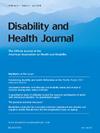“I'm completely off base here on what this child is capable of”: A qualitative analysis of how medical ableism manifests in PICU clinicians' care of children with severe neurological impairment
IF 3.7
2区 医学
Q1 HEALTH CARE SCIENCES & SERVICES
引用次数: 0
Abstract
Background
Children with severe neurological impairment (SNI) are at heightened risk of experiencing medical ableism from clinicians in the pediatric intensive care unit (PICU), where barriers such as time scarcity and heavy workloads limit clinicians’ ability to provide personalized care.
Objective
To examine medical ableism and strategies to support PICU clinicians in understanding the lives of children with SNI and their families.
Methods
This US-based, single-center, qualitative study included PICU clinicians identified by the parents/caregivers of a child with SNI. Semi-structured 1:1 60-min interviews about the challenges of caring for children with SNI were conducted virtually. Coded data were extracted, thematically analyzed, and further conceptualized using the Dual Process Theory (DPT) bias reduction framework.
Results
Nineteen PICU clinicians participated. Three major themes emerged: 1) assumptions and misconceptions about children with SNI and their families, 2) barriers to providing personalized care, and 3) clinician-suggested strategies to honor the lives of children with SNI. These themes aligned with the DPT framework. As outlined in the DPT, system 1 “fast thinking” errors occur when quick observations inform decisions (e.g., snap judgments about a child's capabilities). Second, barriers (e.g., insufficient time for meaningful interactions) may prevent clinicians from providing unbiased care. Third, system 2 “slow thinking,” where complex decision-making occurs, and can be enhanced through personalization strategies (e.g., viewing visuals of the child at baseline health).
Conclusions
Increasing clinician awareness of their potential implicit biases and utilizing bias reduction strategies to mitigate medical ableism in care are critical areas for future research.
"我完全不了解这个孩子的能力":对重症监护病房(PICU)临床医生在护理患有严重神经损伤的儿童时如何表现出医疗能力歧视的定性分析。
背景:在儿科重症监护病房(PICU)中,严重神经损伤(SNI)患儿遭受临床医生医疗能力歧视的风险很高,因为时间紧、工作量大等障碍限制了临床医生提供个性化护理的能力:目的:研究医疗能动性和策略,以支持 PICU 临床医生了解 SNI 患儿及其家人的生活:这项定性研究以美国为基地,由患有自闭症儿童的父母/监护人确认的 PICU 临床医生参与。研究人员通过虚拟方式进行了 1:1 60 分钟的半结构化访谈,探讨了护理 SNI 患儿所面临的挑战。对编码数据进行提取、主题分析,并使用双重过程理论(DPT)减少偏差框架进一步概念化:结果:19 名 PICU 临床医生参加了此次活动。结果:19 名 PICU 临床医生参加了此次活动,他们提出了三大主题:1)对 SNI 患儿及其家庭的假设和误解;2)提供个性化护理的障碍;3)临床医生建议的尊重 SNI 患儿生活的策略。这些主题与 DPT 框架相一致。如 DPT 所述,系统 1 "快速思考 "错误发生在快速观察做出决定时(例如,对儿童能力的快速判断)。其次,障碍(如没有足够的时间进行有意义的互动)可能会阻碍临床医生提供无偏见的护理。第三,系统 2 的 "慢速思维 "会导致复杂的决策,可以通过个性化策略(例如,查看儿童基线健康状况的视觉效果)来提高决策效率:结论:提高临床医生对其潜在隐性偏见的认识,并利用减少偏见的策略来减轻医疗护理中的医疗能动主义,是未来研究的关键领域。
本文章由计算机程序翻译,如有差异,请以英文原文为准。
求助全文
约1分钟内获得全文
求助全文
来源期刊

Disability and Health Journal
HEALTH CARE SCIENCES & SERVICES-PUBLIC, ENVIRONMENTAL & OCCUPATIONAL HEALTH
CiteScore
7.50
自引率
6.70%
发文量
134
审稿时长
34 days
期刊介绍:
Disability and Health Journal is a scientific, scholarly, and multidisciplinary journal for reporting original contributions that advance knowledge in disability and health. Topics may be related to global health, quality of life, and specific health conditions as they relate to disability. Such contributions include:
• Reports of empirical research on the characteristics of persons with disabilities, environment, health outcomes, and determinants of health
• Reports of empirical research on the Systematic or other evidence-based reviews and tightly conceived theoretical interpretations of research literature
• Reports of empirical research on the Evaluative research on new interventions, technologies, and programs
• Reports of empirical research on the Reports on issues or policies affecting the health and/or quality of life for persons with disabilities, using a scientific base.
 求助内容:
求助内容: 应助结果提醒方式:
应助结果提醒方式:


